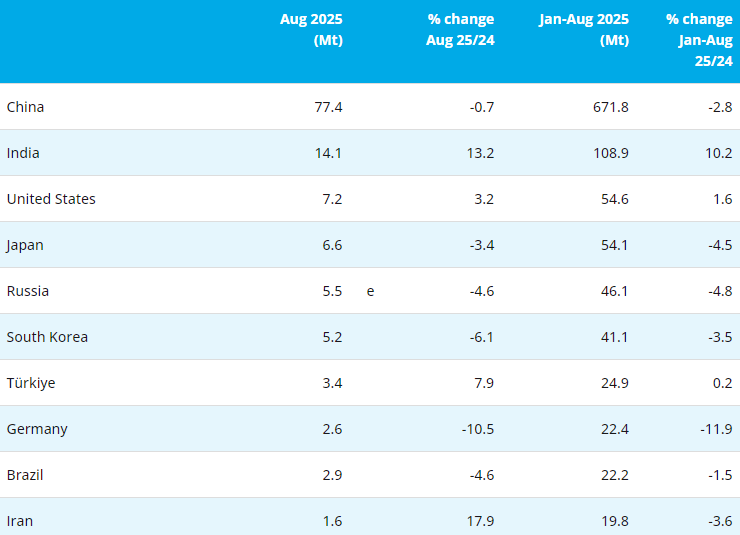Steel producers are using the financial crisis as an alibi for a sharp downturn in prices which they themselves triggered with aggressive pricing earlier this year, Juergen Nusser, president of the European association of steel service centers and of the European federation of steel, tubes and metal distributors, told Platts Monday.
"Steel producers triggered a very volatile cycle by raising prices like idiots in early 2008," Nusser said in response to a question about the causes of the recent steel price meltdown. Nusser considers credit restrictions -- which clearly impacted both steel processors and end-users – falling demand downstream and project postponements as contributing factors to the current situation, rather than primary causes.
"In late 2007, stockholders and service centers stopped buying in order to adjust balance sheets for the new year. The subsequent pick-up in demand in early 2008 was misinterpreted by mills as a new 'golden age' of steel demand," Nusser said, adding that distribution was by far the biggest customers for steelmakers.
He placed further blame on steel producers saying that they failed to take into account early indicators of declining economic growth and steel demand: "All leading indicators have been pointing downwards since 2007, and mills should have expected the impact that their high prices would have."
The magnitude of 2008 steel price fluctuations is very apparent when looking at prices of EU hot-rolled coil imports throughout the year. According to Platts data, spot HRC import prices into Europe surged 79.5% between the start of 2008 and their peak in mid-July. They then fell over 58% to the current level of Eur410/mt [$524.48/mt] CIF Antwerp.
When asked to forecast how long the current de-stocking would take, Nusser said that a lot depended on stock levels in consuming industries. "There are no reliable statistics for these, although from past experience, at the summit of the price cycle, consumer stocks are double the amount available in the distribution channels."
RELATIONSHIPS MEAN BUYERS STAY QUIET ABOUT RENEGOTIATION'S
Considering the recent drop in spot prices, it is no surprise steel buyers now want to negotiate discounts in long-term contracts, but few are vocal about their victories over suppliers, because of the fear that they will damage relationships with suppliers on which they are very dependent.
In spring 2008, when prices were at their peak, mills aggressively introduced surcharges to minimize losses caused by a surge in yearly prices of iron ore and coking coal. By doing so, they weakened the perceived binding nature of contracts in the steel supply chain, and some buyers suggested that a backlash would one day be forthcoming. "They are ripping up contracts, and will live to regret this," was a common phrase used by sore steel buyers at the time.
According to Platts data, spot import prices of HRC into Europe have fallen over 58% since their peak in July 2008. Inevitably, "there are now a number of long-term contracts with big disconnects to the spot market," Nusser said. Nusser also highlighted the difference between mill-tied service centers, who he argued are following mills' strategies, and independents.
Some independent buyers, including a German tube mill and a large service center, have told Platts they have successfully obtained discounts on long-term contracts with steel mills, however they are reluctant to speak on the record.
Generally-speaking, buyers are closely tied to their supplier. The technical difficulty involved in switching supplier, and preferential deals negotiated with favored buyers -- who are often those who initially complied with mill surcharges -- mean that few buyers are willing to risk comprising these relationships.
The high level of consolidation of steel producers in Europe is also preventing buyers from voicing discontent, they say, as compromised relationships would be harder to replace. -Platts
Copyright © 2013 Ferro-Alloys.Com. All Rights Reserved. Without permission, any unit and individual shall not copy or reprint!
- [Editor:editor]



 Save
Save Print
Print Daily News
Daily News Research
Research Magazine
Magazine Company Database
Company Database Customized Database
Customized Database Conferences
Conferences Advertisement
Advertisement Trade
Trade













Tell Us What You Think